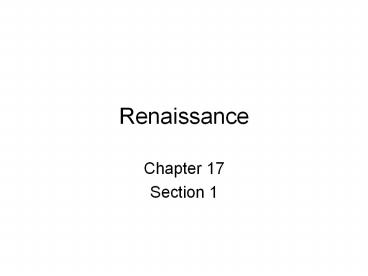Renaissance - PowerPoint PPT Presentation
1 / 34
Title: Renaissance
1
Renaissance
- Chapter 17
- Section 1
2
(No Transcript)
3
Italy Birthplace of the Renaissance1300-1600
- Main Idea
- Revolution The Italian Renaissance was a
rebirth of learning that produced many great
works of art and literature. - Why it matters now
- Renaissance art and literature still influence
modern thought and modern art. - Renaissance Rebirth (in art and learning)
4
What 3 advantages fostered the Renaissance in
Italy?
- 1. Cities and City-States
- Italy urban areas large towns
- Rest of Europe rural
- Bubonic plague led to decreased population and
increased wages art
5
2. Merchants Medici
- Merchants made money due to trade
- They dominated politics
- Unlike royalty, they valued individual
achievement - Medici family- one of the most powerful families
of the Renaissance - Patrons of the arts, bankers, rulers
6
3. Greek and Roman Influence
- Ruins of Rome inspired art and architecture
- Western scholars studied Latin (Roman)
manuscripts (writings) - Christian scholars studied Greek manuscripts that
were rescued from Constantinople
7
(No Transcript)
8
A New Attitude
- Reading classical works led to changes in
thinking - Humanism an intellectual movement focusing on
human potential and achievement instead of
suffering and piety - Led to the study of history, literature,
philosophy (aka Humanities)
9
Worldly Pleasures
- News flash you can enjoy life without offending
God! - This idea allowed wealthy people to spend money
on things for themselves without feeling guilty. - People are more secular focused on things in
this world instead of their spirits and what
happens after death.
10
Patrons of the Arts
- Patrons support artists
- Patrons were wealthy families, merchants and
church leaders - Supporting artists and buying art showed your
power, influence and money
11
Patrons of the Arts
- Patronage is the support, encouragement,
privilege and often financial aid given by a
person or an organization.
12
The Renaissance Man
- The idea was that all educated people should or
be expected to create art. - Ideal man masters every area of study
- Men should be charming, witty, well educated,
dance, sing, play music, write poetry, ride
horses, play sports.
13
The Renaissance Woman
- Expected to know the classics be charming
- Should inspire art, not create it
- More educated than
- medieval women
14
Isabella dEste
- 1474-1539
- First Lady of the Italian Renaissance.
- Great patroness of the arts.
- Known during her time as First Lady of the
World!
15
Changes in Art
16
1. Realism Expression
- Expulsion fromthe Garden
- Masaccio
- 1427
- First nudes sinceclassical times.
17
2. Perspective
- The Trinity
- Masaccio
- 1427
Perspective!
Perspective!
Perspective!
Perspective!
Perspective!
Perspective!
Perspective!
First use of linear perspective!
What you are, I once was what I am, you will
become.
18
3. Classicism
- Greco-Roman influence.
- Secularism.
- Humanism.
- Individualism ? free standing figures.
- Symmetry/Balance
The Classical PoseMedici Venus (1c)
19
4. Empasis on Individualism
- Batista Sforza Federico de Montefeltre The
Duke Dutchess of Urbino - Piero della Francesca, 1465-1466.
20
More on Art
- Anyone with money wanted to be a patron of the
arts, including the pope. - The new focus on individualism inspires people to
commission paintings of themselves. - Popes and other church officials show their
influence by commissioning art that glorifies the
church.
21
Leonardo da Vinci Renaissance Man
- known for Mona Lisa and The Last Supper (showed
personalities of the disciples) - well-rounded painter, architect, engineer,
sculptor, scientist
22
The Last Supper
23
Mona Lisa
24
(No Transcript)
25
The Sistine ChapelMichelangelo Buonarroti1508
- 1512
26
The Sistine Chapel Details
The Last Judgment
27
Sculpture
- The human figure is beautiful and is depicted in
life-like form. - Celebrate the animal, natural beauty of man!
- Michelangelo, Donatello, Cellini, Bernini, da
Vinci
28
The Liberation of Sculpture
- David by Donatello
- 1430
- First free-form bronze since Roman times!
29
David Verrocchio1473 - 1475
30
- David
- MichelangeloBuonarotti
- 1504
- Marble
31
? 15c
Whatadifferenceacenturymakes!
16c ?
32
Renaissance Writing
- Vernacular- writing in ones own language, before
this time people wrote in Latin even if they
spoke another language day to day. - Writing became a form of self expression or
portray individuality. - Ex Francesco Petrarch his sonnets about Laura.
Some called Father of Renaissance humanism. - Boccaccio and his famous writing-Decameron
writing about individuals and the human
condition, showing both tragic and comic views of
life.
33
The Prince Machiavelli
- How to gain power and keep it
- Not concerned with morals, only what is
politically effective - Must appear trustworthy and avoid suspicion but
be ready to mislead people if necessary
34
(No Transcript)































